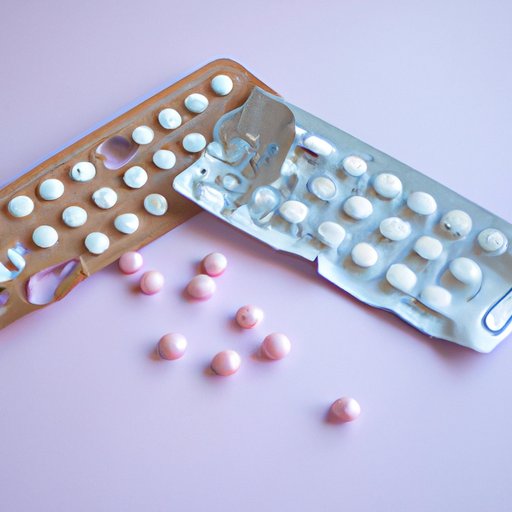
Introduction
If you have decided to stop taking birth control pills and are wondering how soon you can get pregnant, you may have many questions. One of the most common concerns of women who are considering pregnancy is the effects of birth control pills on fertility. This article aims to provide you with a comprehensive guide on fertility after stopping the pill.
The Truth About Fertility After Quitting Birth Control Pills
Birth control pills are a popular method of contraception among women. These pills contain hormones that prevent ovulation, which is the release of an egg from the ovaries. Many women take these pills for years before deciding to plan a pregnancy. However, the use of birth control pills can affect fertility in several ways.
According to studies, most women experience a return to normal fertility patterns within a few months after stopping the pill. However, the exact time it takes for ovulation to resume can vary from woman to woman. While some women may ovulate immediately after stopping the pill, others may take several months or more to regain normal fertility.
Age is also a factor in fertility after stopping the pill. Women who are younger tend to return to normal fertility patterns more quickly than those who are older.
Waiting to Conceive – Understanding the Timing After Stopping Your Pill
The menstrual cycle is an essential part of fertility, and the use of birth control pills can affect it. After stopping the pill, it may take several months for the menstrual cycle to return to normal.
One of the keys to becoming pregnant is to determine when ovulation occurs and the fertile window. The fertile window is the time when the egg is available for fertilization, and it typically lasts about six days each cycle. Determining the fertile window can improve the chances of successfully conceiving.
The most reliable way to determine ovulation is by using ovulation predictor kits, which can detect the hormones in urine that indicate ovulation. Another way of determining ovulation is by tracking your basal body temperature, which rises during ovulation.
From Pill to Pregnancy: Understanding the Process and What to Expect
The process of conception involves several steps, including ovulation, fertilization, and implantation. After stopping the pill, the body needs to readjust to its natural hormonal cycle, which can take some time.
While most women experience no difficulties in becoming pregnant after stopping the pill, some may encounter obstacles. These challenges may include ovulatory dysfunction, which is caused by hormonal imbalances, and tubal or pelvic factors, such as blocked fallopian tubes or endometriosis.
The typical timeline for conception after stopping the pill varies from woman to woman. Some women may become pregnant within a few months, while others may take longer. Generally, it is recommended that couples allow up to a year to conceive naturally.
Conception Expectations: The Science Behind Getting Pregnant After Stopping the Pill
Several factors contribute to successful conception. These include the frequency and timing of intercourse, the quality and quantity of sperm, and the condition of the reproductive organs.
The hormones that regulate the menstrual cycle and affect fertility can also be impacted by stopping the pill. It can take several months for the body to reach a natural hormonal balance, which can affect ovulation and the chances of becoming pregnant.
If you have been trying to conceive for several months without success, it may be time to seek medical assistance. Your doctor may perform several tests to determine the cause of the difficulty and assist you in improving your chances of becoming pregnant.
Getting Your Body Ready – Tips for Navigating Fertility After the Pill
Preconception care is essential for both partners when planning a pregnancy. It involves several steps, such as optimizing nutrition, getting adequate exercise, and avoiding harmful substances, such as alcohol and tobacco.
Lifestyle factors can also impact fertility. It is essential to maintain a healthy weight, get enough sleep, and avoid stress. Alternative therapies such as acupuncture and herbal supplements may also aid in conception.
Conclusion
In conclusion, stopping birth control pills to plan a pregnancy can be a significant decision for many women. It is essential to understand the effects of these pills on fertility, and the possible challenges that may arise when trying to conceive. By monitoring the menstrual cycle, understanding the fertile window and maintaining a healthy lifestyle, you can increase your chances of successfully getting pregnant.
It is important to remember that every woman’s experience is unique, and fertility after stopping the pill can vary. If you have any concerns or questions regarding your fertility or difficulty in conceiving, speak with your doctor.




